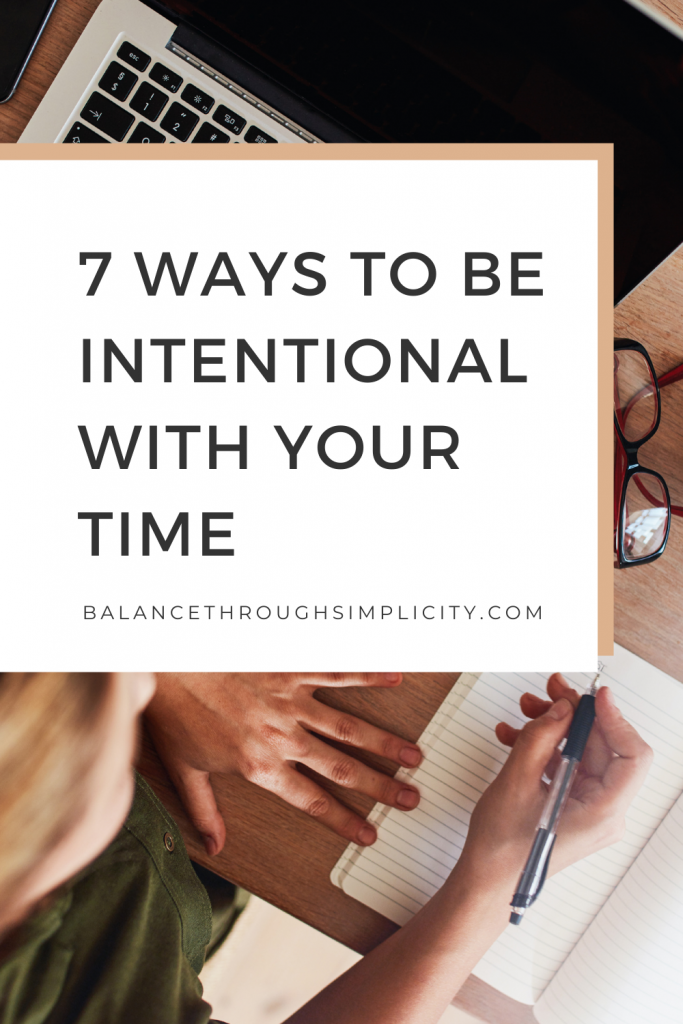7 WAYS TO BE INTENTIONAL WITH YOUR TIME
There are many ways we can begin to live intentionally, crafting a life that’s more on our terms instead of what modern, busy life has in mind for us. If you’d like to create more time for what matters to you, slow down whilst still getting done what you need, here are 7 ways to be intentional with your time.
A QUICK INTRODUCTION TO INTENTIONAL LIVING
Intentional living is about knowing what you want from life and making space for that to happen. There are plenty more fluffy definitions but this is the basic premise. As much as possible, you clear the clutter from your life and the things which pull you off course and instead find ways to give yourself more time, space and energy for what matters to you.
This won’t make for the perfect life but it often helps to make things easier and more aligned with your priorities and passions – the things which lift you up instead of what brings you down.
Through your daily choices, actions and decisions, you’re able to deliberately and purposefully craft a life that’s more on your terms.
These intentional decisions can apply to many aspects of our lives – our finances, our health habits, our self-care, career opportunities, our home and family. They can be big or small, but over time they can breathe new energy into a life that you might be currently feeling a little out-of-sync with.
If you’d like some background to intentional living and how you can get started for yourself, I invite you to check out these two articles:
- What is intentional living – A beginner’s guide
- 5 decisions that inspired my intentional life – A personal story
WHY IT’S IMPORTANT TO BE INTENTIONAL WITH YOUR TIME
As we’ve explored, intentional living is about making purposeful and deliberate choices about how and where you invest your resources. This could be your money, energy, love, space, freedom, motivation and focus. You can be intentional at work, intentional about your home, your relationships, spending habits and your goals for the future.
Your time is arguably one of your most limited resources. We can change or influence our life in many ways but, as they say, time waits for no-one.
No matter who or where you are, there’s not a lot that we can do to stop the passing of time. If you’re looking to live intentionally and create a life that truly supports you, one of the key considerations is how you spend your time.
REFLECT ON YOUR OWN RELATIONSHIP WITH TIME
Before we look at ways to be intentional with your time, let me ask you some questions to explore how you manage your own time right now. Knowing how you feel about something is the first step in knowing what might need to change:
- When you go to bed at night, do you feel content, settled and happy with what you’ve done today?
- If you look at your schedule for the next week, does it show a healthy balance between the things you need to do and the things you want to do?
- When was the last time you assessed what you really ‘need’ to do? Do these needs really reflect how you want to live your life every day?
- When was the last time you had some free time to fill as you’d like (even if it’s doing nothing at all)?
- What does your To Do list or your diary say about you? Overstretched, busy because you don’t know how to say no, you don’t want to miss out, or you feel you’re doing life wrong if you’re not jam-packing every square inch of it?
- Do you ever get to the end of your To Do list? Do you have tasks rolling over from one day to the next? Do you feel it’s other people’s fault if you don’t get stuff done?
Take a few moments to reflect on some of these questions. Be honest with yourself and don’t rush to come up with the answers. Think about them for a few days and see whether your schedule, To Do list and brain feel overwhelmed, zipping this way and that or just about right.
Managing your time is as much about managing your mindset as it is about managing your diary.
Perhaps it’s time to think about ways you can be intentional with your time. Maybe you could find a little more time for yourself and a little less time running around like a headless chicken?
You might even be surprised that you can get more things done AND still have more time for you by getting the ‘right’ things done, more efficiently.
Further reading: 25 ways to live intentionally every day

LIVING INTENTIONALLY AND PRODUCTIVITY
Here are two little points that are absolutely key to being intentional with your time. Remember them and repeat them often.
- Busy and productive aren’t the same thing: You can be run off your feet but still not achieve what you set out to.
- Productive doesn’t always mean you have to be doing something: A nap can be productive if you need it and it serves a purpose i.e. makes you feel better!
The guiding principle of living intentionally is to define your priorities and live your every day aligned (as much as possible) with those priorities. This is exactly what great time management is all about – you work out what needs to be done and find the best and most effective way of achieving that – without clutter (or, in this case, distraction).
Time management and productivity tips share so many parallels with intentional living and minimalism and that’s probably why I love to share practical tips about getting organised and productive on my website about intentional living.
7 WAYS TO BE INTENTIONAL WITH YOUR TIME
In this next section I’m sharing 7 ways to be more intentional with your time so you can carve out more time for what matters to you. I hope they help!
1. Define what’s important
Living intentionally gets complicated and messy if you don’t know what you want out of life. How do you know what to focus on, let in, clear out or change if you haven’t identified what’s important to you? This applies to many aspects of your life whether it’s decluttering your kitchen cupboards or assessing your diary for the coming week.
Do you want free time with your family, more time for hobbies, less stress for a calmer mind, more flexibility and wiggle room instead of feeling like you’re constantly rushed, more time for training for a career change.
Define what’s important so you know what needs to take priority on your schedule.
Suggested reading: How to set goals and keep them (there’s a free goal-planning toolkit you can download)
2. Assess your schedule regularly
Every day, week or month (whatever feels comfortable to you), sit down and take some time to look at your diary. What do you have coming up over the next few days? Have you listed all your appointments, activities and places to be?
Now that you can see it in front of you, how does it make you feel? Too much, too little? How much free time do you have? Have you left enough wiggle room for emergencies? Does the look of your schedule stress you out or inspire you with enthusiasm for this precious life of yours?
“The busier you are, the more intentional you must be.”
Michael Hyatt
Suggested reading: Monthly checklist to simplify your life
3. Get comfortable with saying no
One of the most common reasons many of us have for filling up our schedules is because we don’t feel comfortable saying no. It’s ok to say no if you don’t want to do something. You can fluff it up by saying “no, not right now”. You could say “no thanks but maybe later”. Or even provide a reason, “I’ve got a deadline at work that’s taking up my time so I can’t right now”. You could even get brave and say “no”. On its own. Full stop.
Saying no can feel uncomfortable if we don’t practice it. We don’t want to appear rude or selfish and often, we don’t want to miss out in case we don’t get the opportunity or invite again. If this resonates with you, flip your thoughts around. You might be saying no to one thing but it’s actually enabling you to say yes to something else.
What could you say no to today and what else does that free you up for instead? Think back to those priorities we talked about in point 1 above.
4. Stop multi-tasking
Doing too many things at the same time confuses your mind and makes you less effective and efficient. It takes time for your brain to adjust to different tasks and we stop-start until our brain adjusts to the job in hand. You can read more about the effects of multi-tasking here.
Sometimes life requires us to remember or do things at the same time but wherever possible, commit to doing just one task at a time.
Focus on getting it done without distractions and you’ll find you get it done quicker and better. Tick it off and move onto the next thing when you’re ready.
5. Be less busy
Being busy creeps up on us, especially if you’re not looking! Taking regular stock of your schedule and being mindful of where and how you spend your time can help us be less busy. Do the things which you need to do, choose to do the things that you want to do and let go of the rest. It doesn’t have to be forever, it could just be for this week, month, term, holiday, weekend – however long feels right to you.
Learn to appreciate the value of slow living and being less busy in a busy world. This could be by saying no (see point 3), understanding what just clutters your schedule (point 2) or simply just intentionally choosing to do less – less activities, less on your task list, less pulls on your brain and energy.
6. Have less on your To Do list
If you have a busy family and busy life, having less to do might seem enviable but impossible. I agree it may feel like this but I encourage you to try decluttering your To Do list. Make it simple but strategic by having, at most, 3-5 things you want to get done today.
Be selective with what you choose to include. Your To Do list is not a dumping ground for all the thoughts in your brain, or a list of things to remember. It’s purely for things that you need to achieve today so you can switch off in the evening feeling pleased and content with what you’ve done. Anything that you don’t get done can go on your list for tomorrow.
Suggested reading: How to write a To Do list to get things done
7. Create a plan for your day
I find my own days flow better when I have a flexible structure for how they go. Getting up a little earlier than my family to have some time for myself in the morning helps me plan my day ahead without rush or stress. I close my day in the evening by putting my house to bed and calming my body and brain with an evening routine. These two practices book-end my day no matter what else happens in between.
During the day I have some other habits which I do every day. These help me run my home, manage my diary, kids and work, look after myself and create some quality time for what’s important to me – without feeling like I’m being stretched in every direction.
Suggested reading: How to create a daily routine for your day
“We become what we repeatedly do.”
Sean Covey

MAKING THE CHANGES
In the beginning, making changes can seem impractical or out-of-reach but I encourage you to start with one idea and try it out for size. You could, for example, write out a To Do list right now for things you need to get done today. Just include 3-5 things, nothing more. Write a list each day for the next week and see how much you can tick off your list and how it makes you feel inside. Lighter, more at ease?
Habits and routines build up over time, just like how busy our schedule gets, and we don’t always realise it until we feel that something’s not right. Making changes to our schedule, habits and routines can help us prevent burn-out and frustration.
What would you be doing with your days and your time if you had more peace, ease, freedom and calm?
CONCLUSION
In this article we looked at some intentional ways to manage your time and get more of the ‘right things’ done. We explored how to:
- Define what’s important (To identify what’s just clutter)
- Assess your schedule regularly (Review and prepare)
- Get comfortable with saying no (Say yes to something important)
- Stop multi-tasking (Focus on one thing at a time)
- Be less busy (Create space, cut your stress)
- Have less on your To Do list (Keep it simple and strategic)
- Create a plan for your day (Establish a framework)
Being intentional with your time is one of the cornerstones of intentional living. How you invest your time is key to creating a life where you call more of the shots.
I hope these time management and productivity tips help you maximise your time and be intentional how you spend it, whether it’s in your personal life or in the workplace.
RESOURCES ON PRODUCTIVITY AND TIME MANAGEMENT
If you’d like some more resources to help you carve out more time in your day, slow down and use your time intentionally, these may help:
- How to plan for the week ahead – Tips to get a head-start and prepare for the coming week
- How to be consistent to get things done – Consistency is the secret sauce to making things happen, the slow and steady way
- 25 ideas for a simple morning routine to kick-start your day – According to Henry Ward Beecher, the first hour of the morning is the rudder for your day. These ideas will help your day go in the direction you want it to go
- 15 ways to be more productive – Get more done in less time
- Maximise Your Time – My popular little time management course to help you go from overwhelmed to organised, the simple and intentional way

